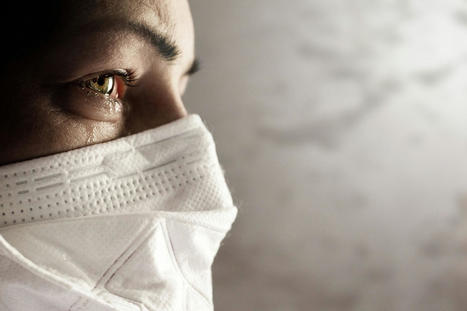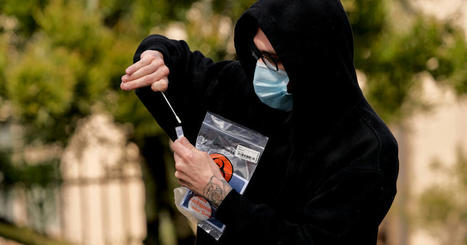 Your new post is loading...

|
Scooped by
Juan Lama
|
In the light of emerging SARS-CoV-2 variants of concern (VOC), bivalent COVID-19 vaccines combining the wild-type spike mRNA with an Omicron VOC BA.1 or BA.4-5 spike mRNA became available. This non-randomized controlled study examined adverse reactions, PRN (pro re nata) medication intake and inability to work after a fourth COVID-19 vaccination among 76 healthcare workers. As fourth dose either the original, monovalent BNT162b2mRNA (48.7%) or the bivalent BNT162b2mRNA original/Omicron BA.4-5 vaccine (51.3%) was administered. The rate of adverse reactions for the second booster dose was significantly higher among participants receiving the bivalent 84.6% (95% CI 70.3%-92.8%; 33/39) compared to the monovalent 51.4% (95% CI 35.9-66.6%; 19/37) vaccine (p=0.0028). Also, there was a trend towards an increased rate of inability to work and intake of PRN medication following bivalent vaccination. In view of preprints reporting inconclusive results in neutralizing antibody levels between the compared vaccines, our results and further studies on safety and reactogenicity of bivalent COVID-19 booster vaccines are highly important to aid clinical decision making in the choice between bivalent and monovalent vaccinations. Preprint available in medRxiv (Nov.8, 2022): https://doi.org/10.1101/2022.11.07.22281982

|
Scooped by
Juan Lama
|
Long-haul COVID-19 patients face many health threats -- including a higher chance of dying -- up to 6 months after they catch the virus, according to a massive study published in the journal Nature. A second study, released by the CDC on Friday, also found lingering symptoms months later among COVID-19 patients who originally had mild symptoms. For the Nature study, researchers examined more than 87,000 COVID-19 patients and nearly 5 million control patients in a federal database. They found COVID-19 patients had a 59% higher risk of death up to 6 months after infection, compared to non-infected people. Those findings translate into about eight extra deaths per 1,000 patients over 6 months, because many deaths caused by long-term COVID complications are not recorded as COVID-19 deaths, the researchers said. Among patients who were hospitalized and died after more than 30 days, there were 29 excess deaths per 1,000 patients over 6 months. “As far as total pandemic death toll, these numbers suggest that the deaths we’re counting due to the immediate viral infection are only the tip of the iceberg,” Ziyad Al-Aly, MD, the senior author of the study and a director of the Clinical Epidemiology Center at the Veterans Affairs St. Louis Health Care System, said in a news release from the University of Washington Medical School in St. Louis. Johns Hopkins University says more than 3 million people worldwide and about 570,000 people in the United States have died of coronavirus-related reasons. Long-haul COVID patients also had a much higher chance of getting sick, and not just in the respiratory system, according to the study. The patients had a high rate of stroke and other nervous system ailments; mental health problems such as depression; the onset of diabetes; heart disease and other coronary problems; diarrhea and digestive disorders; kidney disease; blood clots; joint pain; hair loss; and general fatigue. Patients often had clusters of these ailments. And the more severe the case of COVID-19, the higher the chance of long-term health problems, the study said. Researchers based their study on health care databases of the U.S. Department of Veterans Affairs. Besides the 87,000 COVID patients, the database included about 5 million patients who didn’t catch COVID. The veterans in the study were about 88% men, but the large sample size included 8,880 women with confirmed cases, the news release said. Al-Aly, an assistant professor at Washington University Medical School, said the study shows that long-haul COVID-19 could be “America’s next big health crisis.” “Our study demonstrates that up to 6 months after diagnosis, the risk of death following even a mild case of COVID-19 is not trivial and increases with disease severity,” he said. “Given that more than 30 million Americans have been infected with this virus, and given that the burden of long COVID-19 is substantial, the lingering effects of this disease will reverberate for many years and even decades.” Meanwhile, the CDC on Friday released a new study of people who had milder cases of COVID-19. It found that almost two-thirds of them returned to the doctor within 6 months of their initial infections with new symptoms. The study validates the accounts of many COVID-19 long haulers who say they are still sick months later though their initial infections were mild. More than 3,100 cases were reviewed for the study. None of the patients had been hospitalized for their initial infections. The study found that nearly 70%, or 2,100 people, with mild infections treated by the Kaiser Permanente health system in Georgia returned to the doctor 1 to 6 months after that initial diagnosis, and nearly 40% needed to see a specialist. Compared to people who didn’t return to the doctor after recovering from their initial infections, the long haulers were more likely to be African American, women, and people over the age of 50. About 10% of them were given a second diagnosis of an active COVID infection. “Health care providers used the diagnosis of active infection to indicate that the effects of COVID-19 were affecting medical care at the time of the visit,” study author Alfonso Hernandez-Romieu, MD, said in an email. “Therefore it cannot be determined whether patients might have been experiencing symptoms of reinfection with SARS-CoV-2, rather than ongoing COVID-19 symptoms,” said Hernandez-Romieu, who is part of the clinical team at CDC studying the long-term complications of COVID-19. Pulmonologists, cardiologists, neurologists, and mental health professionals were some of the most frequently consulted specialties. The study authors say doctors should be aware that patients coming to them might have new symptoms related to a past COVID diagnosis. See also publication in Nature (April 22, 2021): https://doi.org/10.1038/s41586-021-03553-9 Publication in MMWR (April 23, 2021): http://dx.doi.org/10.15585/mmwr.mm7017e3
|

|
Scooped by
Juan Lama
|
Two nurses have been placed on administrative leave after at least 77 inmates at the Iowa State Penitentiary in Fort Madison received shots that contained six times the recommended dosage. Dozens of inmates at an Iowa prison were sickened this week after the prison’s nurses inadvertently administered overdoses of the Pfizer coronavirus vaccine, an error medical experts fear could erode trust among a population already wary of vaccinations. At least 77 inmates at the Iowa State Penitentiary in Fort Madison received shots on Tuesday that contained six times the recommended dosage. The Iowa Department of Corrections said that it had temporarily halted administration of the vaccine at the facility and that two nurses had been placed on administrative leave pending an investigation. Cord Overton, a prison spokesman, said that none of the inmates had been hospitalized, but that they were suffering from ailments consistent with people who have had adverse reactions to the vaccine, including body aches and low-grade fever. While prison inmates in most states have begun to receive vaccinations, the hesitancy rate among both incarcerated people and prison guards is a concern for public health officials. In Pennsylvania, for example, as many as 75 percent of correctional staff and 45 percent of inmates have not yet been inoculated, despite the availability of the vaccine. Public health experts fear that given the reluctance to get inoculated, outbreaks in correctional facilities might continue well after much of the rest of society has been vaccinated, creating islands of infection. Jaimie Meyer, an associate professor at the Yale School of Medicine, said dosing errors involving the Pfizer vaccine had been “rare.” She said that medical care at prisons presented particular problems because of inadequate staffing. “When there’s a single nurse practitioner who’s meant to take care of a thousand patients, they often don’t have the same levels of support that you would elsewhere,” Dr. Meyer said. In Iowa, the Corrections Department said its nurses had been told to follow the instructions on the medication when preparing the doses and to consult a statement on proper procedures from the manufacturer.

|
Scooped by
Juan Lama
|
Two-thirds of those in the study sought medical care a month to six months afterward, and about two-thirds of those who sought care were found to have an entirely new medical condition. Most adults who test positive for the coronavirus don’t require hospitalization but tend to seek medical care in subsequent months, and two-thirds of those who do are told they have a health condition they did not have before. These are the findings of a study conducted by investigators from the Centers for Disease Control and Prevention and Kaiser Permanente, which included some 3,171 members of the Kaiser Permanente Georgia integrated health care system. More than half were Black. The message for patients is that even for those who have had only mild Covid-19, “it’s possible you may experience new or persistent symptoms months after the initial diagnosis,” said Dr. Alfonso C. Hernandez-Romieu, an infectious disease specialist with the C.D.C., and the study’s lead author. “And it’s important for people to make sure they’re going to their clinicians,” he said, to express their concerns. “It’s equally important,” he added, “for clinicians to acknowledge that there may be these long-term effects and to really make sure they’re validating patients, treating them with empathy and trying to help them in the best way possible.” Clinicians need to monitor patients for Covid-19-related complications that are potentially very serious, like blood clots, he said. The study did not compare patients who tested positive for the coronavirus to patients who did not, so the authors were unable to say whether people who had recovered from mild Covid-19 cases made more doctors’ visits than those who never had the virus. But two-thirds of the patients who had mild disease sought medical care one to six months after their Covid-19 diagnoses, and about two-thirds of those who sought care were found to have an entirely new condition. The new diagnoses included cough, shortness of breath, heart rate abnormalities, chest or throat pain, and fatigue, “which likely represent ongoing Covid-19 symptoms,” the study said. Among those more likely to seek medical care were adults 50 and older, women and those with underlying health conditions. Black adults were also slightly more likely than others to seek care. But over all, the authors noted, the number of visits declined over time. The potential for long-term complications, even after a mild course of disease, underscores the need for prevention measures and vaccination, Dr. Hernandez-Romieu said. “There is a lot we don’t know about post-Covid conditions,” he said. “Even though a majority of people don’t end up with severe Covid, or end up in the hospital, the potential for long-term health effects is really important.” Cited study published in MMWR (April 23, 2021): http://dx.doi.org/10.15585/mmwr.mm7017e3
|



 Your new post is loading...
Your new post is loading...










